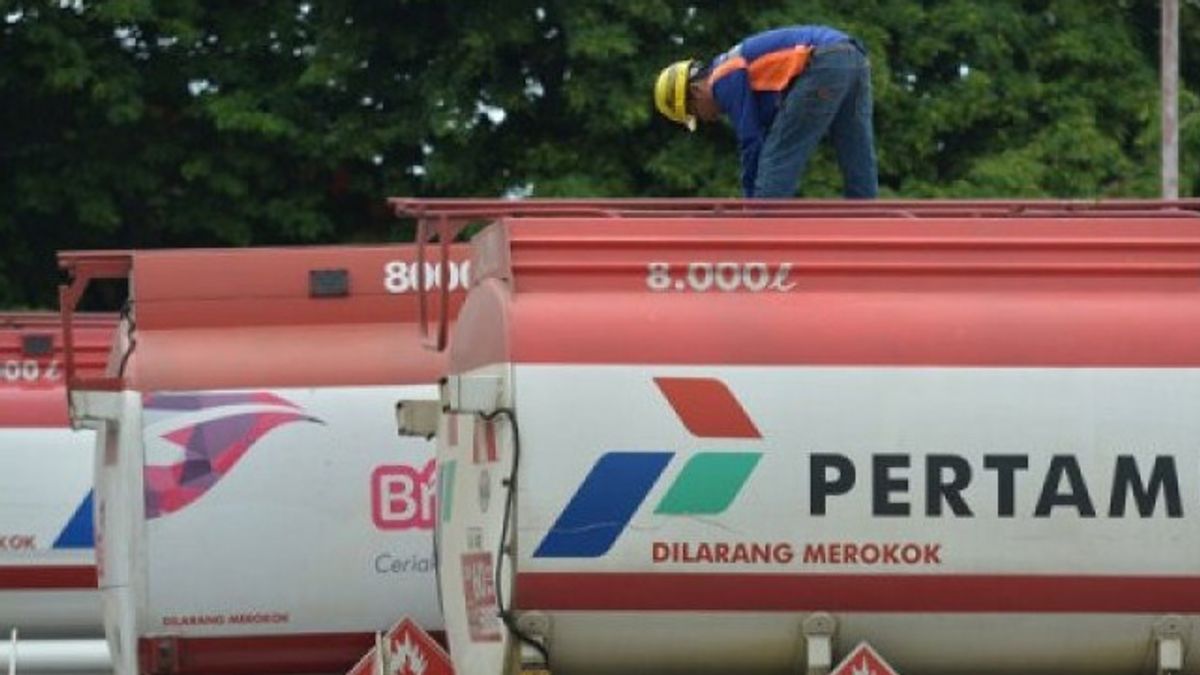JAKARTA - The National Transportation Safety Committee (KNKT) released the results of its investigation into a series of tank trucks loaded with fuel oil (BBM) belonging to Pertamina on Jalan Transyogi, Cibubur, Bekasi, West Java.
Acting Head of the Traffic Investment Committee for Jalan KNKT, Ahmad Wildan, explained the chronology that started from a truck departing from TBBM Plumpang, North Jakarta at around 14.00 WIB to Cileungsi, Bogor Regency, West Java.
The tank trailer truck carrying a cargo of 24,000 liters of Pertalite fuel was manned by 2 people, namely the driver of a driver assistant.
The tank trailer truck passes through the Rawamangun-Cawang Toll Road route. While in the Rawamangun area, the driver heard a noise as if there was a press air leak. Then the driver stopped the vehicle and checked, but the source of the noise was not found. The driver then returned to the cabin and decided to continue his journey. The tank trailer truck exited the Cibubur Toll Gate then took the Transyogi road.
"Drivers are starting to feel the brakes are not standard," he said at a press conference in Jakarta, quoted Wednesday, October 19.
Then the driver decided to move lane 1 and tried to stop the tank trailer truck by constantly stepping on the footbrake pedal and trying to move it to the lower gear but failed.
"When approaching APILL CBD, the road began to decline and there were queues of vehicles stopping. The driver tried to pull the hand brake and trailer brakes but the tank trailer truck did not slow down, resulting in successive collisions," he continued.
Meanwhile Wildan revealed that no traces of braking were found on the road surface where the collisions were successive.
He added that there is a difference in height of 20 meters at a distance of approximately 1 km, which is a risk of failure to climb and failure to braking because the road factor is relatively very small.
For this reason, continued Wildan, the NTSC concluded that the successive collision was caused by a tanker truck that experienced braking failure due to the availability of press air in the tube below the threshold.
With the report on the results of the investigation, the NTSC also issued two recommendations addressed to the Directorate General of Land Transportation of the Ministry of Transportation.
The first is to ask the Directorate General of Land Transportation to prohibit the use of telolet horns for large vehicles in Indonesia.
He further added, based on the findings of the investigation conducted by the NTSC, there was an additional route that took from the wind cylinder to the horn, making the wind filling not optimal.
"With a normal time of about 4-6 minutes, the NTSC found that the Pertamina tanker could only fully fill the wind cylinders for 14 minutes," he added.
The second recommendation is to ask the Ministry of Transportation to provide guidance and supervision of this provision. Both through motor vehicle testing and coaching to transportation associations for goods and passengers.
The English, Chinese, Japanese, Arabic, and French versions are automatically generated by the AI. So there may still be inaccuracies in translating, please always see Indonesian as our main language. (system supported by DigitalSiber.id)
Most Popular Tags
#Prabowo Subianto #New Year #Mother's Day #nataru #NatalPopular
23 Desember 2024, 00:04
23 Desember 2024, 01:47









